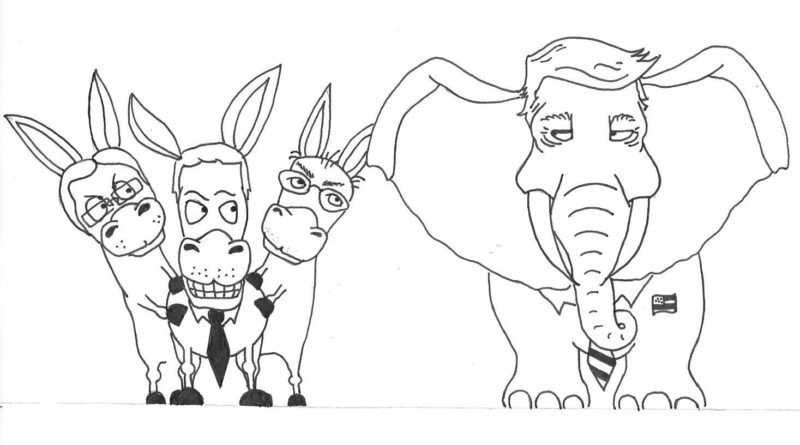2020 introduces new pool of presidential candidates
With a new election year right around the corner and primary debates already underway, it is becoming increasingly important that voters start considering their options. Tennessee, like many other states, has an open primary, meaning that any registered voter can participate in either primary regardless of their party affiliation.
It is important that voters look at candidates in both the Republican and Democratic parties—especially if they are undecided, so that they know which primary to participate in.
The Republican primary has a small pool of candidates this year. They are as follows: former reality TV star and current president, Donald Trump; former congressman and governor of South Carolina, Mark Sanford; former congressman of Illinois, Joe Walsh; and former governor of Massachusetts, William F. Weld.
The latest poll has Trump polling at 85%, while 11% of the voters were still undecided leaving a measly 4% split amongst the other three candidates. Trump’s current term has seen him focus on building a wall on the southern border and other similar immigration reform, repeal several environmental regulations, and create tax cuts for large businesses and high-income individuals.
The Republican parties of five states—Kansas, Alaska, South Carolina, Arizona, and Neveda—have already canceled their primaries in hopes of casting their votes towards Trump; however, it is unclear if the primaries will remain canceled considering that legal suits surrounding the cancellations are already being filed in South Carolina.
A vote to move forward with the inquiry of impeachment of President Trump was passed by the House on Oct.1. It is still too early to see if the impeachment process will greatly affect Trump’s campaign. The Senate could vote to remove him from office and disqualify him from holding office in the future.
Dr. Mark O’Gorman, professor of Political Science here at Maryville College, said that by then it might be too late in some states to remove him from the ballot. Still, republicans and right-leaning independents might want to look into the three other candidates.
The Democratic primary is in a very different situation with a record breaking eighteen candidates running, but thirteen of them are polling at 2% or less. O’Gorman said that this is a result of the left seeing Trump as vulnerable.
The current polls from New York Times have former Vice President Joe Biden polling in the lead at 26%. Senator of Massachusets, Elizabeth Warren is right behind him at 21%. Next is Bernie Sanders, senator of Vermont, at 14%; Pete Buttigieg, military veteran and Mayor of South Bend, Ind., at 8%; and Kamala Harris, senator of California, at 4%.
Biden sees his campaign as his last attempt at running for president and as a way to stop Trump from “fundamentally [altering] the character of this nation.” Unlike Trump’s economic focus on large corporations, Biden will focus on protections for low-income workers. Warren has detailed plans on tax reform and income inequality.
Buttigieg’s campaign is focusing on climate change and on his status as the youngest candidate at thirty-seven and the second openly gay man to run for president. Of the Democratic front runners, Harris is the only candidate with an intense focus on liberal social issues as well as middle-class tax cuts.
Many of the other Democratic candidates polling at 2% or less have more moderate views, which, along with a general lack of media coverage, may explain their polls.
“It’s hard for candidates to appeal to both sides of the current system,” said Dr. Jeff Bay, professor of Statistics here at Maryville College. In essence, politically moderate candidates struggle to get past the primaries. This election might be a way for these candidates to get their feet wet and gain momentum for future campaigns.
Both sides of the political spectrum see our current system as inherently broken with extremely different views on how to fix it. The right has found their hero in Trump, while the left, faced with their greatest enemy yet, has yet to find theirs.
It is more important than ever for those of eighteen years of age or older to register to vote, double check the status of their voting registration, and do the necessary research on the current candidates in order to make an educated voting decision in the 2020 primaries and general election.

